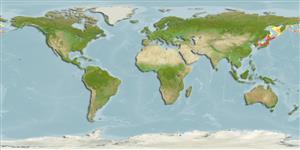Teleostei (teleosts) >
Perciformes/Zoarcoidei (Eelpouts and pricklebacks) >
Zoarcidae (Eelpouts) > Gymnelinae
Etymology: Gymnelopsis: Gymnelopsis = Gymnel(us) + Greek suffix -opsis, like (that is, similar to), resembling, appearance. Gymnelopsis is like genus Gymnelus (E. Spencer, pers.comm. 09/13).
Environment: milieu / climate zone / depth range / distribution range
Ecology
Marine; demersal; depth range 85 - 780 m (Ref. 50550). Temperate
Northwest Pacific: Sea of Okhotsk.
Size / Weight / Age
Maturity: Lm ? range ? - ? cm
Max length : 25.2 cm SL male/unsexed; (Ref. 11954)
Life cycle and mating behavior
Maturity | Reproduction | Spawning | Eggs | Fecundity | Larvae
Masuda, H., K. Amaoka, C. Araga, T. Uyeno and T. Yoshino, 1984. The fishes of the Japanese Archipelago. Vol. 1. Tokai University Press, Tokyo, Japan. 437 p. (text). (Ref. 559)
IUCN Red List Status (Ref. 130435: Version 2024-2)
Threat to humans
Harmless
Human uses
Tools
Special reports
Download XML
Internet sources
Estimates based on models
Preferred temperature (Ref.
123201): 0.6 - 6.2, mean 1.6 °C (based on 51 cells).
Phylogenetic diversity index (Ref.
82804): PD
50 = 0.5312 [Uniqueness, from 0.5 = low to 2.0 = high].
Bayesian length-weight: a=0.01000 (0.00244 - 0.04107), b=3.04 (2.81 - 3.27), in cm total length, based on all LWR estimates for this body shape (Ref.
93245).
Trophic level (Ref.
69278): 3.2 ±0.4 se; based on size and trophs of closest relatives
Resilience (Ref.
120179): Low, minimum population doubling time 4.5 - 14 years (Preliminary K or Fecundity.).
Fishing Vulnerability (Ref.
59153): Low vulnerability (21 of 100).
